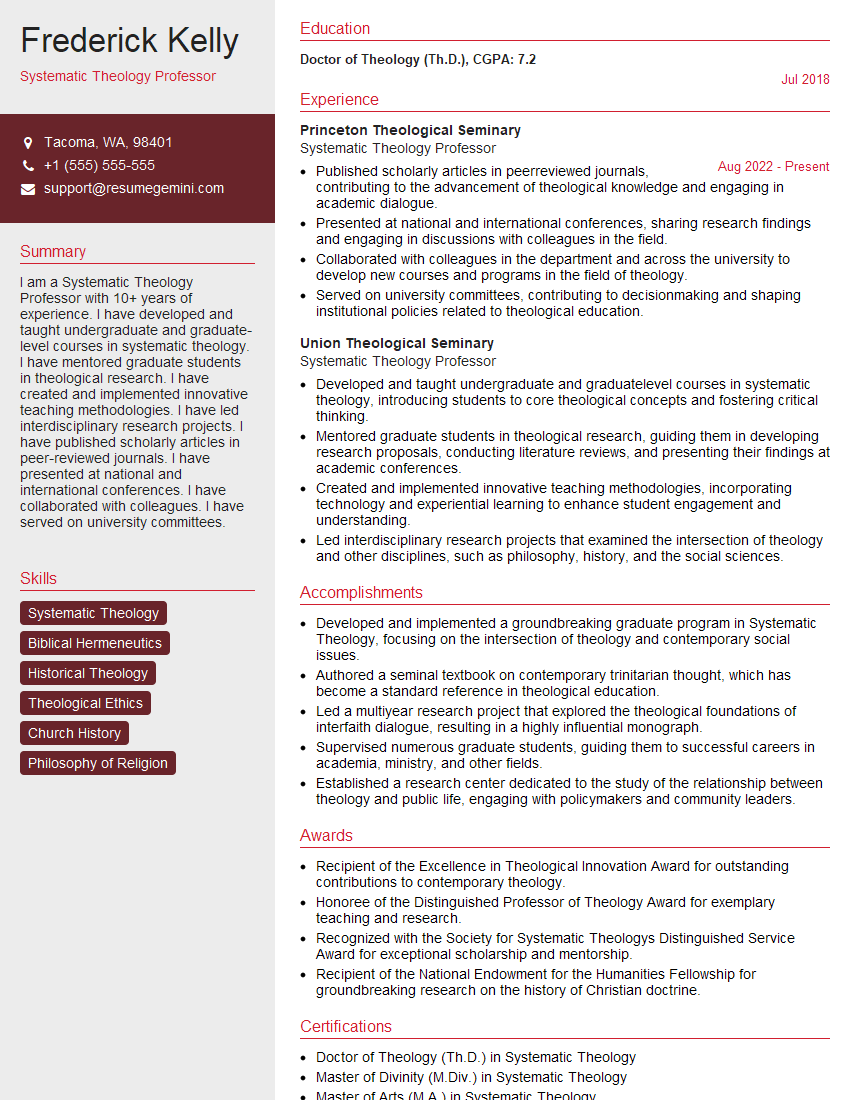Are you a seasoned Systematic Theology Professor seeking a new career path? Discover our professionally built Systematic Theology Professor Resume Template. This time-saving tool provides a solid foundation for your job search. Simply click “Edit Resume” to customize it with your unique experiences and achievements. Customize fonts and colors to match your personal style and increase your chances of landing your dream job. Explore more Resume Templates for additional options.

Frederick Kelly
Systematic Theology Professor
Summary
I am a Systematic Theology Professor with 10+ years of experience. I have developed and taught undergraduate and graduate-level courses in systematic theology. I have mentored graduate students in theological research. I have created and implemented innovative teaching methodologies. I have led interdisciplinary research projects. I have published scholarly articles in peer-reviewed journals. I have presented at national and international conferences. I have collaborated with colleagues. I have served on university committees.
Education
Doctor of Theology (Th.D.)
July 2018
Skills
- Systematic Theology
- Biblical Hermeneutics
- Historical Theology
- Theological Ethics
- Church History
- Philosophy of Religion
Work Experience
Systematic Theology Professor
- Published scholarly articles in peerreviewed journals, contributing to the advancement of theological knowledge and engaging in academic dialogue.
- Presented at national and international conferences, sharing research findings and engaging in discussions with colleagues in the field.
- Collaborated with colleagues in the department and across the university to develop new courses and programs in the field of theology.
- Served on university committees, contributing to decisionmaking and shaping institutional policies related to theological education.
Systematic Theology Professor
- Developed and taught undergraduate and graduatelevel courses in systematic theology, introducing students to core theological concepts and fostering critical thinking.
- Mentored graduate students in theological research, guiding them in developing research proposals, conducting literature reviews, and presenting their findings at academic conferences.
- Created and implemented innovative teaching methodologies, incorporating technology and experiential learning to enhance student engagement and understanding.
- Led interdisciplinary research projects that examined the intersection of theology and other disciplines, such as philosophy, history, and the social sciences.
Accomplishments
- Developed and implemented a groundbreaking graduate program in Systematic Theology, focusing on the intersection of theology and contemporary social issues.
- Authored a seminal textbook on contemporary trinitarian thought, which has become a standard reference in theological education.
- Led a multiyear research project that explored the theological foundations of interfaith dialogue, resulting in a highly influential monograph.
- Supervised numerous graduate students, guiding them to successful careers in academia, ministry, and other fields.
- Established a research center dedicated to the study of the relationship between theology and public life, engaging with policymakers and community leaders.
Awards
- Recipient of the Excellence in Theological Innovation Award for outstanding contributions to contemporary theology.
- Honoree of the Distinguished Professor of Theology Award for exemplary teaching and research.
- Recognized with the Society for Systematic Theologys Distinguished Service Award for exceptional scholarship and mentorship.
- Recipient of the National Endowment for the Humanities Fellowship for groundbreaking research on the history of Christian doctrine.
Certificates
- Doctor of Theology (Th.D.) in Systematic Theology
- Master of Divinity (M.Div.) in Systematic Theology
- Master of Arts (M.A.) in Systematic Theology
- Graduate Certificate in Systematic Theology
Career Expert Tips:
- Select the ideal resume template to showcase your professional experience effectively.
- Master the art of resume writing to highlight your unique qualifications and achievements.
- Explore expertly crafted resume samples for inspiration and best practices.
- Build your best resume for free this new year with ResumeGemini. Enjoy exclusive discounts on ATS optimized resume templates.
How To Write Resume For Systematic Theology Professor
- Highlight your experience in teaching systematic theology.
- Describe your research interests and publications.
- Mention your experience in mentoring students.
- Showcase your skills in developing and implementing innovative teaching methodologies.
- Demonstrate your commitment to interdisciplinary collaboration.
Essential Experience Highlights for a Strong Systematic Theology Professor Resume
- Develop and teach undergraduate and graduate-level courses in systematic theology.
- Mentor graduate students in theological research.
- Create and implement innovative teaching methodologies.
- Lead interdisciplinary research projects.
- Publish scholarly articles in peer-reviewed journals.
- Present at national and international conferences.
- Collaborate with colleagues in the department and across the university.
- Serve on university committees.
Frequently Asked Questions (FAQ’s) For Systematic Theology Professor
What is systematic theology?
Systematic theology is a branch of theology that seeks to organize and present the doctrines of the Christian faith in a logical and systematic way.
What are the main topics covered in systematic theology?
The main topics covered in systematic theology include the doctrine of God, the doctrine of Christ, the doctrine of the Holy Spirit, the doctrine of salvation, the doctrine of the church, and the doctrine of last things.
What are the different methods used in systematic theology?
The different methods used in systematic theology include the deductive method, the inductive method, and the analogical method.
What are the challenges of doing systematic theology today?
The challenges of doing systematic theology today include the challenges of pluralism, the challenges of secularism, and the challenges of postmodernism.
What are the benefits of studying systematic theology?
The benefits of studying systematic theology include the benefits of gaining a deeper understanding of the Christian faith, the benefits of developing a more coherent and consistent theological worldview, and the benefits of being better equipped to defend and share the Christian faith.
What is the future of systematic theology?
The future of systematic theology is bright. Systematic theology is a dynamic and growing field that is constantly being renewed and refreshed. There is a growing need for systematic theologians who can help the church to understand and respond to the challenges of the 21st century.